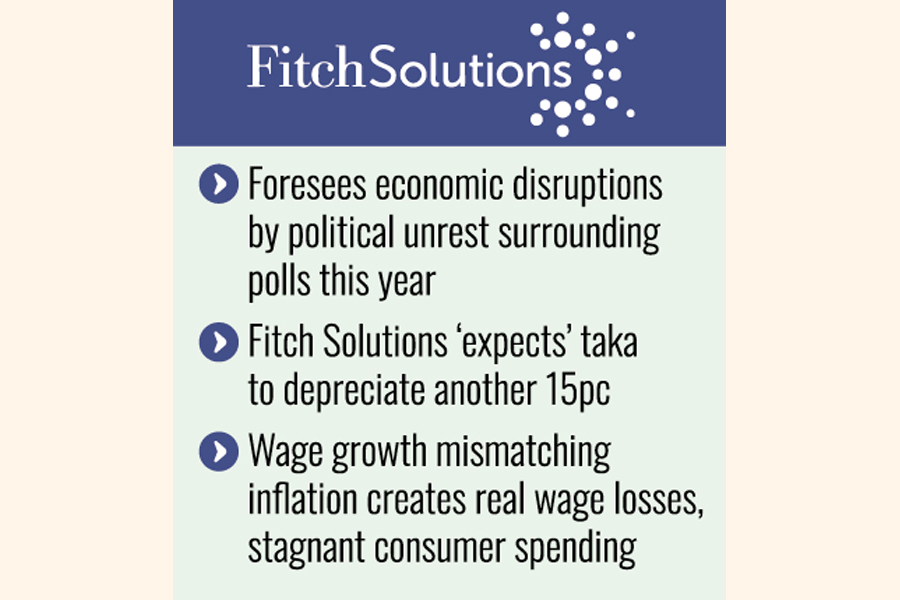
Published :
Updated :

Global rating-agency Fitch paints a downbeat outlook for Bangladesh economy on several grounds that include political unrest surrounding polls.
Fitch Solutions in its latest appraisal report forecasts headline inflation to average 8.5 per cent and intends to revise down its earlier-projected 5.5-percent GDP growth in the country for the current fiscal year.
The ratings agency, dual-headquartered in New York and London, warns that inflation in Bangladesh will remain persistently high despite the central bank keeping its policy rate unchanged at 10 percent in the latest tightfisted monetary policy leveraged by government priority on inflation control.
"We maintain our view that inflation will stay above its (Bangladesh Bank) new target of 7.0-8.0 per cent (previously 6.5 percent), and the Bangladesh Bank (BB) will hold its rate until the end of June next year," says Fitch Solutions.
On a note of skepticism about the central bank's inflation forecast, it cautions that ongoing political uncertainty will fuel inflation expectations, keeping inflation above target until June 2025.
The agency also takes the inflation target for the next fiscal year with a grain of salt.
"We think the Governor's 5.0-percent average inflation forecast for the next fiscal year (2025-26) is too optimistic.
"We now expect headline inflation to average 8.5 per cent in FY2025-26, up from our previous estimate of 8.0 percent," says Fitch Solutions, a research platform within the Fitch Group, provides in-depth analysis of country and industry risks.
Governor Dr. Ahsan H. Mansur, however, remains optimistic that inflation will decline to 6.0-7.0 per cent by June, allowing Bangladesh Bank to start cutting rates within FY2024-25.
Fitch Solutions disagrees: "We think this is unlikely."
Instead, it recommends a further depreciation of the Bangladeshi taka, saying: "We expect the taka to depreciate another 15 percent in 2025."
The agency cites two key reasons for this expectation. First, the central bank has shifted from a crawling peg to a market-determined reference exchange rate. Second, the US Federal Reserve is now expected to cut interest rates by 50 basis points less than previously forecast in 2025.
While increased agricultural output, lower oil prices, and recent monetary tightening could help ease inflationary pressures, the agency notes, these factors would likely be insufficient to offset the negative effects of a sharp currency depreciation. And given Bangladesh's economic outlook, another rate hike is unlikely.
"Recent monetary tightening already slowed private-sector credit growth to 7.3 per cent in December, the lowest since at least 2015," it says.
Moreover, wage growth is lagging behind inflation, leading to real wage losses and stagnant consumer spending.
"As such, we will probably revise down our 5.5-percent GDP-growth forecast for 2025, which is already below the historical average."
The global agency also presumes that general election in Bangladesh might be held earlier than previously expected. "The interim government has announced that general elections will likely take place in FY2025-26, rather than in FY2026-27 as we previously assumed."
This development is "significant", Fitch Solutions notes, because Bangladesh has a history of political unrest around elections.
"These traditional tensions will be heightened by competition between new political parties and existing ones, such as the Bangladesh National Party."
It warns that the economic disruptions it had originally expected in FY2026-27 are now likely to occur in FY2025-26. Combined with high inflation expectations, this will keep inflation elevated.
"For what it's worth, the past three elections have been followed by a rise in inflation that typically lasts for about one quarter," the report mentions.
Beyond domestic political risks, Fitch Solutions also has highlighted potential challenges from a possible US policy shifts under the Trump administration.
A stronger US dollar and increased trade-policy uncertainty could tighten global financial conditions, putting pressure on emerging-market currencies, including the Bangladeshi taka.
This could further complicate Bangladesh Bank's efforts to bring down inflation and transition to a more flexible exchange-rate regime.
jasimharoon@yahoo.com


 For all latest news, follow The Financial Express Google News channel.
For all latest news, follow The Financial Express Google News channel.